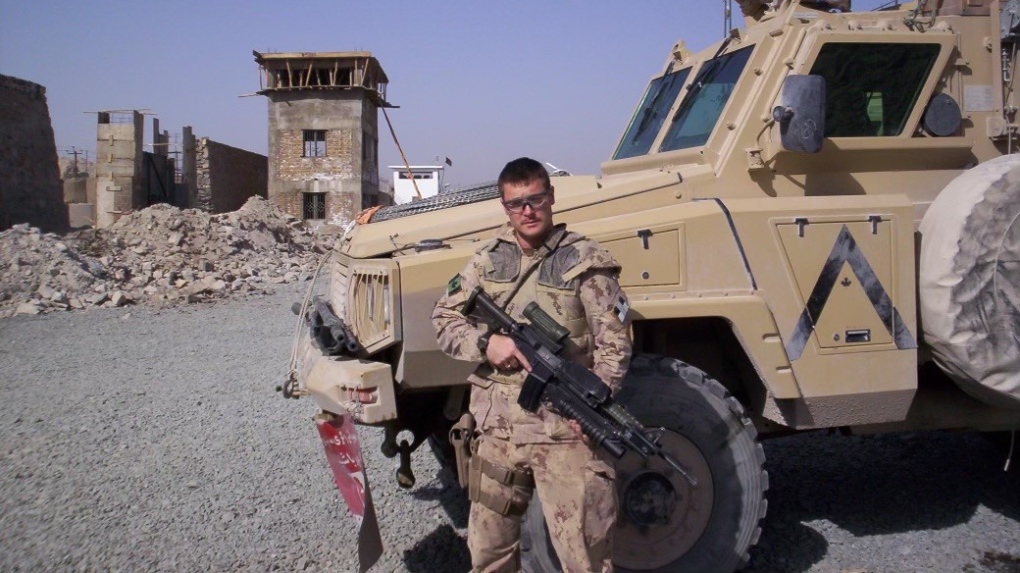Chris Dupee looks proud as he looks at the plaque he received after his 2008 tour in Afghanistan.
“All I can say is it was an amazing experience,” Dupee said. This space has paintings of military scenes, soldiers with poppies, and the odd photo and badge, but not as many military uniforms as one might expect.
“Being in the military is certainly a life-defining experience, but it’s not healthy for it to be a life-defining experience. We need to realize that it’s just a part of who we are as people.” he said.
While Dupee is proud to say he has no regrets, his 10-year military career set him on the path to battling mental illness.
“It pushes you to a mental level that you never thought you’d have to go to,” Dupee said.
Dupee was diagnosed with post-traumatic stress disorder upon his return from deployment and was eventually released from the military.
“It’s just a mirror. We have to look into it, and we have to recognize what we see as our own. Okay, I have PTSD. …Now what?” Dupee said.
It’s something he faced openly in a very candid conversation, and now, years later, he’s able to do it. After struggling to find the right support to suit his style and needs, Dupee realized that the way to help himself was to help others. That led to the creation of Cadence, a mental health treatment center for veterans and first responders that he co-founded in Newmarket, Ont. The center has several bedrooms, a gym, and common spaces that offer a second-stage sober living treatment program. Staff members provide varying levels and types of care for inpatient and day patients.
The focus here is on conversation and community, focusing on front-line trauma and building a welcoming environment designed by veterans to serve other veterans and first responders.
“I’ve been through a hellish journey and I’d like to think I’ve made it out of it. For me, it’s hard to see other people go through that, so I’m going through that experience. “I try to be a voice for people who wish they had heard what someone said to me when they were doing their job,” Dupee said, standing in front of a chalkboard wall in the reception area. The walls are adorned with inspirational quotes from former clients, people who have helped guide those who will follow in their footsteps on the road to recovery.
Trauma and grief are common themes for people on a common journey of pain and recovery.
Ward is candid about his emotions, what led to his suicide attempt, and his subsequent recovery. (Source: Heather Butts)David Ward is one of them. Before he speaks to us, he sits quietly in his room and plays his guitar. Ward served 19 years in the Canadian Armed Forces, including two tours in Afghanistan. He retired from the military of his own accord.
“I tried to move on with my life my way, but ended up getting stuck in a deep rut and attempted suicide with a gun,” said Ward, who now bears the physical scars of mental illness. Ta. leading to his suicide attempt and subsequent recovery.
 Ward served 19 years in the Canadian Armed Forces, including two tours in Afghanistan. (Source: David Ward)
Ward served 19 years in the Canadian Armed Forces, including two tours in Afghanistan. (Source: David Ward)
“The moment I felt the bullet go through my forehead, I realized I was looking at the world wrong and I was wrong. At that point I had lost hope, so that helped me see it in a different light. It opened my eyes,” Ward said.
That was in 2021. Ward witnessed the U.S. withdrawal from Afghanistan leading to the fall of Kabul, then lost a friend to suicide and attempted suicide himself in December 2021.
For the past two years, Ward has focused on regaining his physical strength while working on his mental health. This includes some of his time at Cadence, where he found strength in working with therapists and other veterans.
 For the past two years, Ward has focused on regaining his physical strength while working on his mental health. (Source: David Ward)
For the past two years, Ward has focused on regaining his physical strength while working on his mental health. (Source: David Ward)
“We don’t want people to go in the same footsteps. We have veterans and first responders who have fallen and died from mental health, depression and substance abuse,” Ward said.
“I hope that by being open and being open about my struggle and being open about it, people can empathize and not go down the dark path that so many of us go down.”
Sitting in the common room with our staff, you can see that this space is a community where we support each other through conversation.
“It starts with acknowledging what you’re going through. You have to really understand it. Whether it’s your therapist, your best friend, your mother, or whoever you’re talking to. It helps us get to that point,” Dupee said. He admits that he believes managing mental health is a lifelong journey and should not be undertaken alone.

